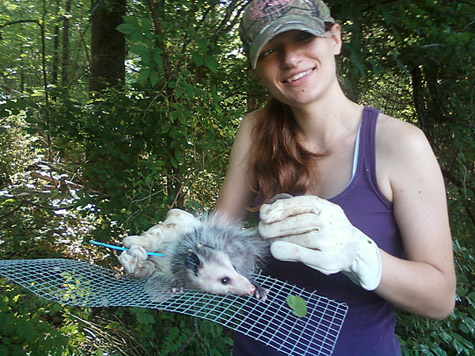
Carlynn Rekosh in the field
 Carlynn Rekosh in the field |
![]()
| Carlynn Rekosh
Department of Biology Title of Presentation: Absence of S. neurona in Virginia o'possums (Didelphis virginiana) in Calloway County Equine Protozoal Myeloencephalitis (EPM) is the most commonly diagnosed neurological disease in horses, and can be fatal. The causative agent of this disease is the protozoan parasite Sarcocystis neurona. A common definitive host is the Virginia o’possum (Didelphis virginiana) which sheds the parasite’s oocysts in its feces. If a horse eats material that has been near o’possum feces, the horse risks ingesting these oocysts and developing EPM. The protozoan has been previously confirmed in western Kentucky, and is of potential concern to local horse owners. I hypothesized that S. neurona is present in the Calloway County area due to the abundance of D. virginiana throughout the county and western Kentucky. To test my hypothesis, fecal samples were obtained from 13 o’possums. The county was divided into ten transects and I obtained permission from various landowners to set traps on their properties. The animals were captured using live traps and held until a fecal sample was expelled. A fecal floatation method was used to release parasite oocysts from the samples, and the oocysts were examined under a microscope. On average, each sample had four different types of parasites. The protozoan S. neurona was not detected in any of the samples, so my hypothesis was not supported. There was no statistically significant difference in parasite occurrence between males and females or between juveniles and adults. I tentatively concluded that S. neurona is not widespread in Calloway County; however, more samples would be necessary to confirm my conclusion.
| College Home Page | Date Modified May 12, 2013 |